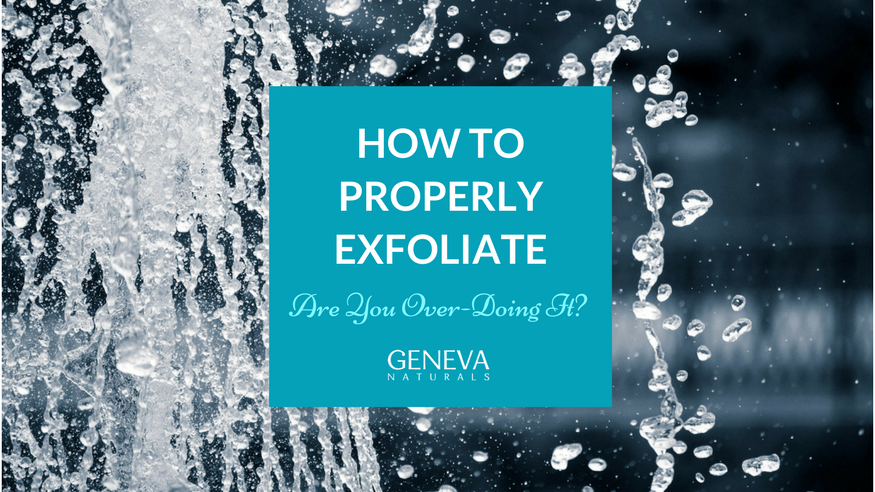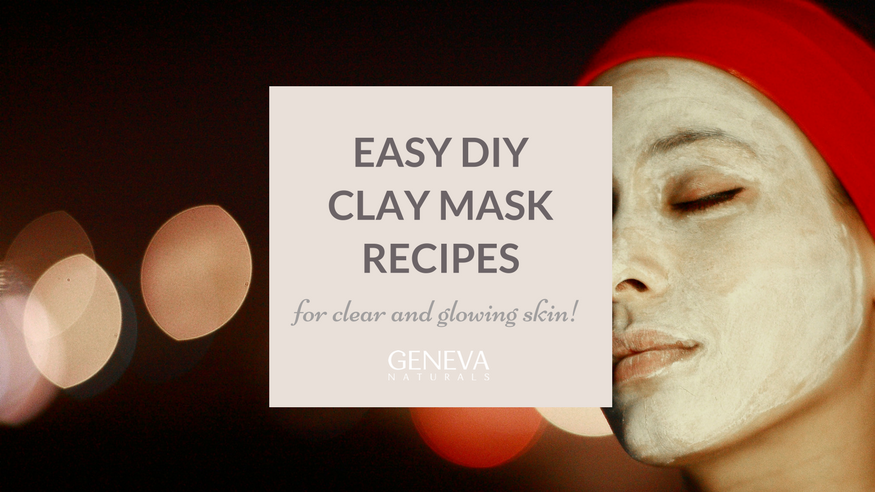Exfoliation: Are You Over-Doing It?


A critical step to obtaining that soft, glowing complexion we all yearn for is to exfoliate your skin. This often over-looked step rids your body of rough, dead skin cells and reveals new, healthy ones underneath. Although this is an important step, many people often overdo it in their eagerness. Over-exfoliating can damage your complexion and do more harm than good, so it is important to know how to exfoliate properly. Whether you're about to start incorporating exfoliation into your skin care routine, or have already done some damage, learn how to properly perform this crucial step!
Benefits of Exfoliating
1. Brightens Skin
No amount of makeup can completely remedy a rough, uneven skin tone. Even if it’s covered up, it can still feel coarse to the touch and looks unnatural. Your best bet to look naturally beautiful—with or without makeup—is to have a smooth, even, and bright skin tone. Your body is constantly cycling through old and new skin cells, so it makes sense that your skin looks and feels uneven as it naturally sheds the old to make way for the new. Exfoliating your skin can help this process along by ridding the skin more quickly of the dead cells causing dark spots and unevenness and revealing the fresh and healthy skin underneath. Not only will your skin feel softer and more even, it will also look brighter and more renewed, giving you a natural, lovely glow.
2. Blasts Blemishes
It’s often not enough to just wash your skin and hope to keep acne breakouts at bay. Because we are exposed to so much dirt, dust and bacteria, (think about how many times you touch your face with your hands, makeup brushes, or cell phone throughout the day!), that nasty buildup on our skin requires more than a simple wash to remove it. Your pores can easily become a breeding ground for acne-causing bacteria; so regular exfoliating will help unclog your pores of what regular cleansing leaves behind and prevent chronic acne and regular breakouts.

3. Fights Wrinkles
As the saying goes, youth is wasted on the young—this is especially true when we are talking skin care. The days of sun tanning without a worry and skipping your nightly cleanse with little consequences are long gone. It seems that fine lines and wrinkles creep onto our skin overnight, and those years of neglecting it may come back to haunt us one day when we look in the mirror. Luckily, we know that exfoliating can not only help prevent premature aging as part of a good skin care routine, but it can also restore youthfulness to aged skin. While it doesn’t necessarily erase existing wrinkles, exfoliating does remove the very top layer of dead skin, lowering the surface to make the skin look more even and wrinkles appear less pronounced. To put it simply, layering makeup on wrinkles only exaggerates, them, while exfoliating effectively minimizes their appearance.
4. Shrinks Pores
Since we know that blemish-producing bacteria like to make their home deep within our pores, especially the ones on our face, it’s important to make that home as tiny as possible. Not only do smaller pores prevent breakouts, but they are less visible on your skin and give your complexion a smoother and healthier look overall. With the buildup of dirt and bacteria, pores naturally expand to make room, making them more visible and prone to blemishes. Exfoliating your skin and ridding your pores of excess particles leaves them squeaky clean once again and allows them to minimize.
5. Promotes Healthy Skin
When done correctly and as part of a consistent beauty regimen, you’d be surprised at how much exfoliating can improve the overall health of your skin. From increasing blood flow and circulation, to improving skin elasticity and allowing better absorption of your other nourishing skin care products, adding exfoliating to your routine may be the key to obtaining the best skin of your life!
Exfoliating your skin sounds pretty good right? Here's a video from Popsugar Beauty on how to exfoliate safely by your skin type:
5 Signs You’re Over-Exfoliating and How to Fix Them
If you’re thinking, ‘wait a minute, I do exfoliate and my skin is still not as healthy as I’d like it to be’, there’s a chance you may be overdoing it and causing more harm than good to your skin. Take a look at these five common signs that may indicate that you are over-exfoliating.
1. You're breaking out
Do you follow your regimen religiously, yet still suffer the occasional (or frequent) breakout? Do you deal with painful, cystic acne despite your best efforts? Over-exfoliating may be the culprit. Your skin has an important job—it has natural oils that protect you from outside bacteria and keep you healthy and safe. If you scrub too hard when exfoliating and remove too many layers of skin and are constantly removing those necessary oils, it can’t do its job as effectively. Over-scrubbing can also cause hypersensitivity to already damaged skin and may delay healing of existing blemishes.
The fix: It’s important to remember that not all skin is created equal, especially when exfoliating. For example, the skin on your feet and back tends to be tougher, while your facial skin is much more delicate. Take care to use exfoliators that are specifically formulated for your face, while more coarse exfoliators are best used on other parts of your body. You probably don’t need to exfoliate every day, especially on the more delicate parts of your body or on places that are prone to breakouts. The frequency with which you should exfoliate depends on your skin type (oily skin needs more exfoliation while dry skin needs less), so if you’re not sure how often to exfoliate, start with once or twice a week and see how your skin reacts. And remember, no two skin types are exactly alike, so listen to your body and do what’s best for you.
2. Your skin feels extra sensitive
If your normally comfortable skin is feeling extra sensitive, it may be due to over-exfoliating. This can mean that you’re either exfoliating too much or too vigorously. By removing too much off the top layers of your skin you leave too much of the thinner, less protective skin below exposed. Because of this, you’ll be much more sensitive to skin and beauty products, prone to redness, and you may even sunburn more easily than usual.
The fix: Don’t feel like you need to scrub until your skin shines when you exfoliate. On the contrary, it takes very little pressure to properly exfoliate your skin, especially if you do it regularly. Remember, you only want to remove the dead, rough cells from the very outermost layer of your skin. If you’ve already got sensitive skin, you don’t have to—and shouldn’t—stop exfoliating altogether. Instead, try using exfoliating products with natural, gentle ingredients that will nourish your skin and allow it to heal. Check out this list of safe ingredients for sensitive skin.

3. You have too much shine
Many people are frustrated with their skin because it looks oily when it really isn’t. If you’ve got a stubborn shine to your face that you just can’t get rid of, it might be time to change the way you exfoliate. You want your skin to be smooth, but can it be too smooth? As it turns out, yes it can. Over-exfoliating excessively strips your skin of its protective layer and leaves a too-smooth surface (especially on the prominent forehead area) that easily reflects light, giving it an overly shiny, oily-looking appearance.
The fix: Once you’ve determined if you are over-exfoliating by doing it too often, or by scrubbing too hard, you can immediately take steps to correct the shine of your skin. Scaling back on either the frequency or intensity of your exfoliating will allow new growth of the outer layer of skin cells and restore the natural sheen of your skin.
4. You have red, puffy skin
Feeling a little swollen? Red, puffy skin that hasn’t been otherwise burned or irritated can indicate over-exfoliation. To get a little technical, the stratum cornier, or top layer of our skin, is made up of three lipids (groups of organic compounds): cholesterol, ceramists, and free fatty acids. These lipids are crucial to the health and function of our skin. If damaged—something easily done by over-exfoliation—these lipids lose their ability to properly control inflammation, resulting in red, inflamed skin.
The fix: Depending on the severity of the inflammation, you may want to take a small break from exfoliating and allow your skin to fully heal before adding it back into your routine. Take a few days to a week off, or at the very least, scale back on how often you exfoliate and be extra gentle when doing so.
5. Your skin is extra dry
As we know, over-exfoliating can quickly strip your skin of its natural oils and remove the layer of skin responsible for locking in moisture. It’s not uncommon to experience a minor level of overall dryness when exfoliating, especially if you’ve just added it to your regimen. But if you experience unusually dry, flaky skin in irregular patches despite the use of moisturizer and lotions, it may be associated with exfoliating.
The fix: Along with decreasing the amount and strength of exfoliating, you’ll want to encourage the return of essential moisture to your skin by using other skin care products with naturally hydrating ingredients. Avoid drying ingredients like alcohol and sodium sulfate, and look for things like hyaluronic acid, glycolic acid and coconut oil or jojoba oil.

More Tips for Exfoliating
1. Become a Morning Person
Not a morning person? Read some tips on how to amp up your mornings here. Beauty experts and dermatologists alike recommend doing your exfoliating first thing in the morning. After thoroughly cleansing your skin before bed, a good night’s rest will allow your skin to most effectively and efficiently repair itself. That means that there are plenty of dead skin cells that need to be sloughed away when you wake up. Exfoliating in the morning is a great way to even out your complexion and reveal a smooth, fresh palate for the rest of your beauty routine.
2. Be Gentle
Perhaps the most important tip for exfoliating the right way—be kind to your skin! It’s always best to err on the side of caution and use less pressure when scrubbing, especially on your face. Avoid exfoliators with coarse ingredients like walnut shells or sea salt, and use soft, circular motions when applying. If you’re in a hurry, resist the temptation to scrub fast and hard and take the time to do it correctly—your skin will thank you!
3. Try Going Natural
It’s become pretty clear in the beauty industry that nature’s way is the best way. There are many recipes for all-natural, inexpensive exfoliators that you can make in your own home using ingredients like sugar, olive oil and essential oils. If you prefer to leave the preparation to the professionals, take the time to read the ingredients and look for exfoliators that use natural ingredients that are beneficial to your skin. And always pair your exfoliator with natural skin care products that don't contain harsh, harmful chemicals and additives.
4. Be Patient
It may take time to find an exfoliator that you—and your skin—love. From chemical exfoliators to those created in your own kitchen, what works for one skin type may have a completely different effect on another. Don’t be afraid to experiment, and allow enough time after using a particular product to let your skin react before moving on to something new.
Take it Easy on Your Skin
Even though exfoliating can do wonders for the health of your skin, it turns out that you can have too much of a good thing. By avoiding the all-too-common mistake of over-exfoliating, you can achieve beautiful, glowing skin that looks as amazing as it feels.
Also in Geneva Naturals

What Is A Retinoid Oil? Retinoid Oil Benefits, Uses, Effects & More

DIY Clay Mask Recipes for Clear Skin



